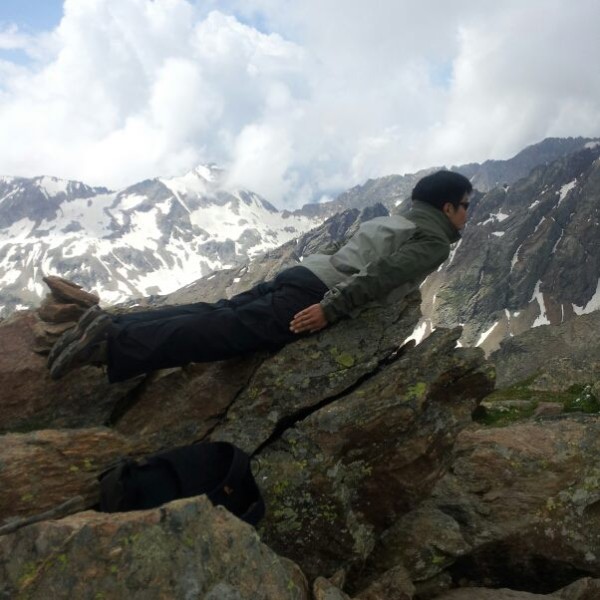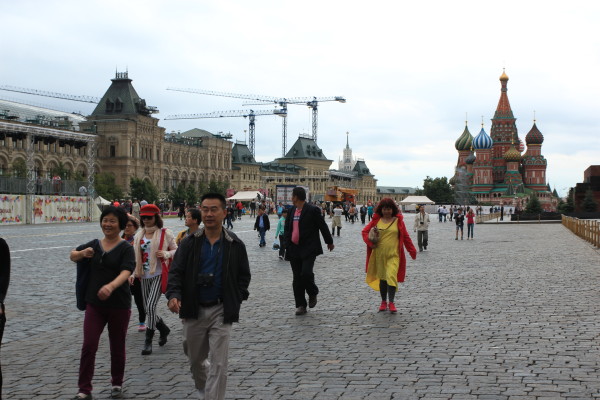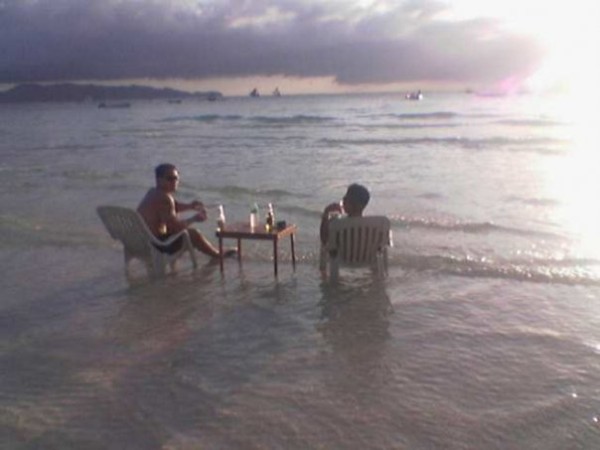Recently, I climbed Mount Elbrus in Russia. Having nothing but my friend and a few books, it was a good time to really take a step back and reflect on society–ton look at a distance and not be affected by its trappings gives some insights. There was something liberating about not being told that “reality” and injustice were related to how I looked in comparison to others, that I could get by on my own skills and wits: up there, age, sex, race, religion–when you’re in the elements, all of that doesn’t matter as you focus on survival and climbing that mountain. Five thousand and six hundred meters up there and back, I felt pretty damn liberated knowing I can carry over 40kg in -30 Celsius weather for nearly two weeks. Adding that to my arsenal of skills that include knowing how to use enough guns to train and arm a small militia, scuba diving, a variety of combat forms, and much more–I certainly don’t define myself by how dark I look compared to others, but how well I can live, starting with basic survival and working my way up to being able to support anyone who needs help. Up there, if you can carry your own weight and equipment and help someone else injured or dying, that’s what matters; nature doesn’t discriminate the way society supposedly does, and if I can overcome nature, society certainly can’t intimidate me (even when people annoy me). If it isn’t obvious from what I commonly advocate, people should travel more, read more, and ask more questions instead of making assumptions.
Up there, several books I (re-)read were Joel Haldeman’s The Forever War, Orson Scott Card’s Ender’s Game and Speaker for the Dead, and Sir James George Frazer’s The Golden Bough: A Study in Magic and Religion, the last of these having a quote that resonates with me:
“We are overwhelmed by our very human need to weave a web of meaning where there may be none.”
Specifically, a lot of the explanations people rush to when trying to explain social injustices and relating it to race, things I never really felt matched up against my own experiences. All one needs to do in order to see what it means to weave a meaning where there may be none is to look at the self-proclaimed truth speakers, “heroes” and Google/Wikipedia “academics” or “activists” whose only raison d’etre that motivates them to rise from sloth and onto message boards is so that they may ejaculate their comments and egos all over the Internet.
Good old Frazer again says it best: “Small minds cannot grasp great ideas; to their narrow comprehension, their purblind vision, nothing seems really great and important but themselves.”
To be fair, one common theme in the Ender series and The Forever War is that the further you get away from “home”, the more detached you are from the social constructs of nationalism and patriotism, but it’s precisely because of that disengagement that it becomes easier to view the absurdity of how much people assign meaning to something that may not even be there, or, in the absolute cosmic sense, is nil. Time operates on another wavelength, because you’re not caught up in the zeitgeist of the society and state you are in by being apart from it. You can follow the news and read up all you want, but you are constantly disengaging from where you supposedly came from. You’re on your own time, and life develops you much differently than the people you are supposedly connected to by passport or race. Likewise, no matter how much people accusing you of “not doing your research” from books or the Internet about a country you intend to travel to, the more it shows they lack life experience: talk about historical facts, yes, that’s one thing, but to describe society is eternally a failing, because there is no true objectivity when talking about cultures, as everyone has a bias–especially travelers (guilty as charged!).
Another example: those who look at Asia and have the audacity to speak with authority about Asian culture without actually having lived there, but claiming their ethnic heritage more than makes up for it, supplemented by militant victimization classes or watching documentaries at film festivals, and reading online message postings written by others.
One of the things I feel is touched upon in this Rolling Stone piece about Tsarnaev is how there was this glorification of the motherland that they had barely any experience in. I see several common factors here in parts of Asian America: the dumbing down and victimization approaches to education, some of the extremely militant courses in ethnic studies that indoctrinate more with hate rhetoric than actually getting people to question reality outside of the pedantic pedagogic methods used to “teach” (depending on whom your professor is), and this glorification of the motherland and culture that many people have almost no real idea or understanding of, which they attach themselves to when they feel alienated and assume that it is because they think they relate more to a culture that they idealize in their heads but don’t actually understand or have experience in.
An acquaintance I highly respect once described his own family immigration story, one I find more in line with the classic American attitude I admire that somehow has been lost in the shared suffering of the 21st century:
When both my grandfather and great grandfather stepped off the boat, they didn’t get a warm handshake from either Grover Cleveland or Woodrow Wilson and a hearty welcome to America. They hit the ground running and by the middle of the Great Depression were buying homes for their families as others were losing them. Neither waited to be invited to be Americans, they declared they were American. Since the family ethos always was no one was going to hand you anything, I grew up expecting neither freebies from life or universal love.
It doesn’t matter where we came from, it’s about where we are going. I fully expect people (re: victims, sheep, and know-it-alls) to dismiss the validity of these statements on account of their favorite verbal arsenal, mostly related to decrying racism or white privilege, or accusing me of ignorance and denial of their reality (re: delusions) they subscribe to. Do I care? I can’t even if I try, especially when the common response I’ve had for what I write are always either ad-hominem attacks on my person (ignorance, arrogance, and not being “open-minded” enough), or are know-it-alls who take special pride in misquoting or distorting what is written to suit their (useless) arguments. But let me recall something good old Mohammed once said:
“Don’t tell me how old you are or how educated you are. Tell me how much you’ve traveled…then I’ll tell you how much you know.”
If you don’t like Mohammed, try Mark Twain, who is apparently so un-cool to political correctness advocates (re: moaning cattle) that we can no longer find the word “nigger” in some editions of his novels: “Travel is fatal to prejudice, bigotry, and narrow-mindedness, and many of our people [Americans] need it sorely on these accounts.”
In my personal experience, it is much easier to be worldly by being both a traveler and a book lover. One without the other generally causes people to perceive reality in a certain way that sounds funny to those without that perspective. Granted, you can be more pleasant company by both having relevant book knowledge or life experience to draw from and the questions you ask, but usually, without either or with only one–most people sound silly. Half-knowledge is worse than ignorance.
For people who travel but don’t read, they come here to Siem Reap, Cambodia and think they are helping orphans by donating money to them, and are better than others for taking pictures playing with them. (On that note: when’s the last time these self-righteous image projectors went to help orphans in the Appalachians?) For those who don’t travel, they read about all the orphanage scams (written by travelers who don’t read as well) and assume all the nonprofit work is all a lie and nobody is actually doing anything to help, but instead serving themselves. For the truly educated and well-traveled person, the balance here is to both read and consider the accounts published but not take them as the be-all end-all, since again, it’s all highly-subjective, and to actually travel there to see for themselves what aligns with what is written, exaggerated, or overlooked.
One of the recent dialogues in some of the online circles I interact with looked at some of the YouTube videos about “Asians” that talked about “10 Things Asian Guys Like” for example–again, something that is difficult to relate to when the video should more appropriately be labeled “10 Things Asian-AMERICAN Guys Like”. We need to really distinguish those differences, and I don’t care if you’ve got Asian pride, but don’t tell me you’re an Asian cultural expert because your parents came from the motherland–Tsarnayev’s ideas of what Chechnya and being Chechnyan were did not accurately reflect reality, as well as having a dubious (mis)understanding of Islam.
Once upon a time, a young black girl was lecturing about African-American culture and history to a Zulu friend and me. Suddenly, he stood up from his seat and shouted, “Seestah, SHADDAP. You be talkin’ about ‘African culture and history’ but you ain’t African; you black and American! I am African; I know what being Zulu is, and I don’t know all of Africa, but at least I know more for sure about one corner of Africa than you who never came there do about any of it! So don’t you lecture me and this Asian fella about Africa!” If only more Asians said that to Asian-Americans. Unfortunately, I’ve seen many more Asian-Asians unable to fathom that many Asian-Americans don’t necessarily think and act the way they (Asian-Asians) do, despite how they (Asian-Americans) look. Oh well. It goes both ways.
Common attack I get: people have accused me and my fellow global nomads as “not getting it” because we weren’t wholly born and bred into the Asian-American experience (you mean there’s only one kind of Asian-American experience?). I’d argue otherwise: it’s precisely that reason we move between societies and cultures that we can get enough of a distance that allows for perspective and analysis without the biases of race, nationalism, patriotism, parochialism, stereotyping, and the illusion of appearing to be an “open-minded good guy liberal”. No glorification by looking at cultures as “others” as well: each one has its greatness and its failings, whether it is America or China and others. And again, anyone who says that they “get” the Asian-American experience by virtue of growing up in America longer than others does not know what it means to be Asian-American, for there are multitudes of immigration experiences and generational differences–which is why everyone should strive to have both life/travel experience and be well-read in order to recognize that diversity of experiences (a few know-it-all expats living in their bubble should read more too). Personally, I believe what creates a group isn’t the shared suffering or longing for a land or culture lost, rather, it is the shared vision and direction moving forward. Unfortunately, you can’t aspire to be great people when worried about being accepted as “normal”, and definitely can’t expect to be “normal” when saying absurdities like “Asians are hip”.
Understandably, there are people who don’t enjoy travel or who don’t have the privilege of travel. What I advocate is a classical definition of an open-mind is: to look at things, consider them, and ask questions instead of making assumptions.
The loudest people are usually the most active (master)debaters, and their understanding of what is good for the collective population isn’t necessarily what is best for everyone. It’s like the Westboro Baptist Church thinks it speaks for all of Christianity. In fact, they don’t even know much about Asian America nationwide, let alone do they know about the vastness of America itself (even within states, there are huge cultural differences, such northern Virginia versus the rest of Virginia, New England versus the Midwest, and the Pacific Northwest and the Southwest). The way I see it, nobody should care about where they came from, but what we are going to do with the opportunities we have to recreate ourselves, since the motherland is often a distant memory, going there for holidays is a different experience from living there, and living as a foreigner also gives you many biases you compare the local culture with against your own. If we obsess about our origins but refuse to really travel and engage other cultures (especially within America), or to actually have that traveler’s mindset of asking questions rather than making assumptions about things different from us, we will spend too much time over-analyzing and trying to create meaning where there is none instead of (re)defining ourselves, and create this egregious misunderstanding of the cultures we exoticize.
I’d rather be that arrogant prick accused of having a chip on his shoulder instead of just some average Asian guy, and I’d rather be an aloof bastard than perpetually stuck trying to find out who I am based on how I look (or looking for people who look like me and expecting them to “get” me). I don’t need thousands of acquaintances who look like me, I’m happy with my Hemmingway-like circle (re: my preferred incestuous bubble) of fellow denizens living in exile who share the same values and ideals, regardless of how they look.
Go out and travel–it’s cheaper and far more rewarding than a college degree now, and is a far better choice than graduate school. Don’t merely be a tourist; be an adventurer. And if your parents disagree with you traveling versus getting a degree, tell them you’ll get three made in Bangkok’s Khaosarn Road for a few hundred Baht and save money instead of incurring more student loan debt. Besides: the ugly American stereotype is quickly being trumped by the Chinese. Go to the library and read more. Don’t think you know the answers, just open yourself to the idea that somewhere out there, no matter how bizarre or farfetched something is, someone actually believes it, and he probably isn’t alone. In the words of Billy Joel, “You may be right, I may be crazy, but I just may be that lunatic you’re looking for.”












